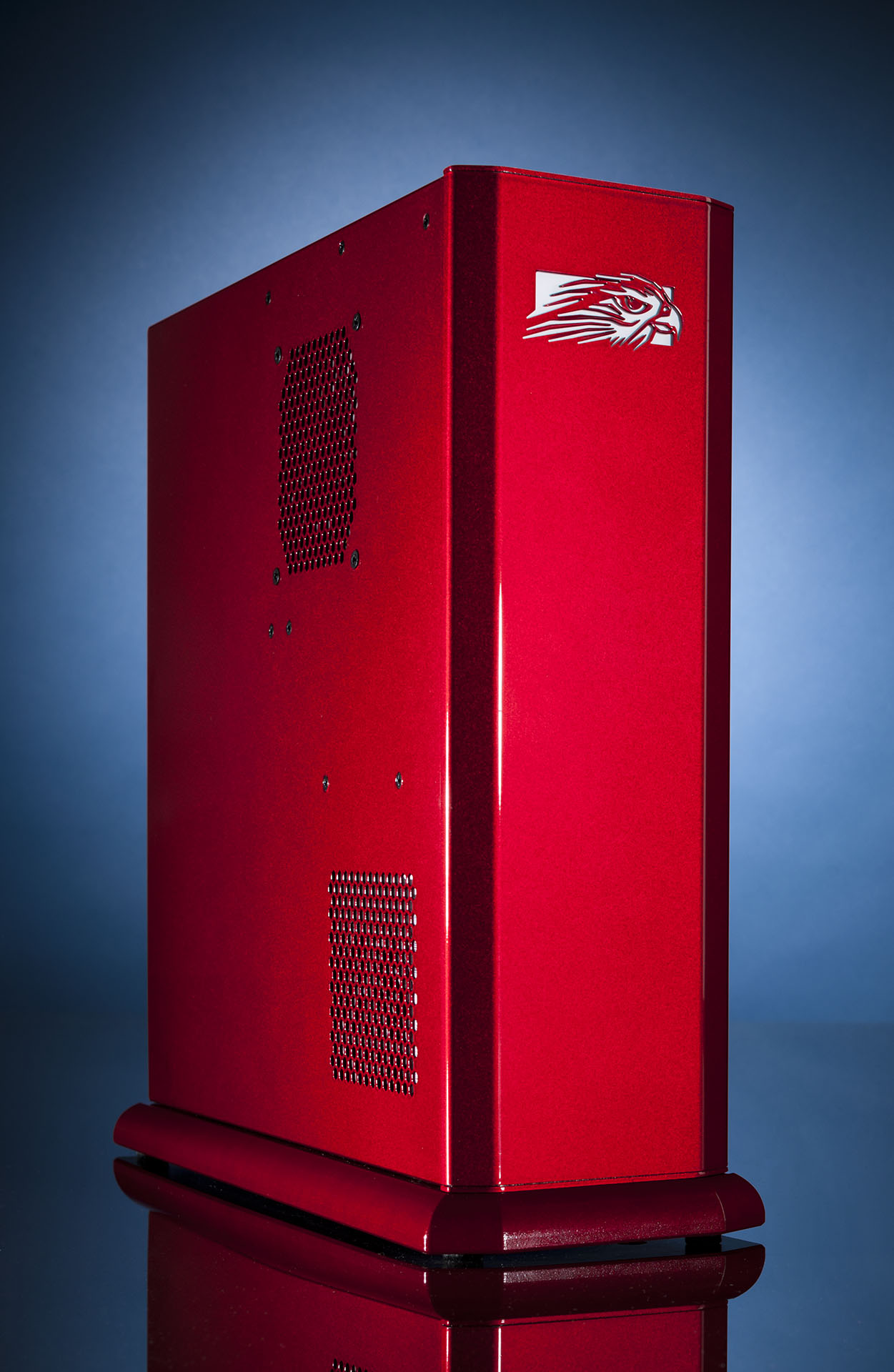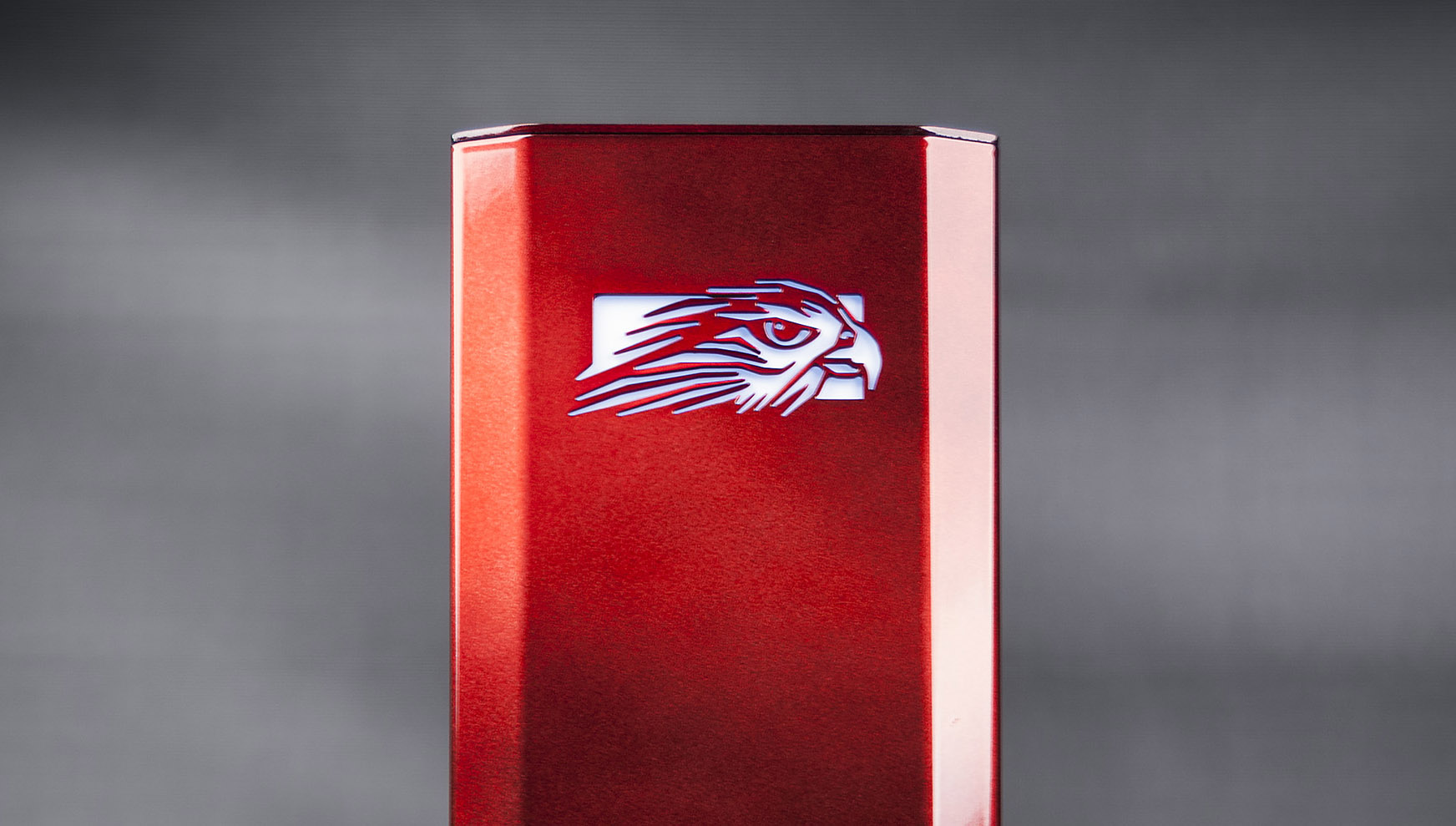Our Verdict
Expensive, but tons of power in a small, beautiful, quiet rig.
PC Gamer's got your back
Good luck finding a more powerful PC in a smaller package
North by Northwest (+): Powerful; quiet; relatively small; lots of storage.
North by Kanye West (-): Not cheap; hard to open and close; slow bootup time.
Back in the day, in order to get an exorbitant amount of PC power, you really needed a hulking desktop. The more likely it was to break your back upon liftoff, the more bad-ass it would be. While a bigger box may give you more legroom for power, little Mini-ITX systems are giving these behemoths a run for their money in performance. On that notion, Falcon Northwest set out to deliver “godlike power” in its Tiki micro tower. After testing it in our Labs, we think even Zeus would be proud.
In terms of offering performance per cubic inch, Falcon Northwest asserts that there is no better Mini-ITX case than its Tiki chassis. The box measures about four inches across, is made of steel and sandblasted aluminum, and has a big single billet aluminum base at the bottom which keeps it stable. While it certainly will keep the Tiki from easily toppling over, some might not like its ornate aesthetics. It looks a bit like a trophy stand your dad would have sitting in the living room. In addition, it doesn’t allow you to lay the Tiki on its side. This is most likely intended, however, considering that there are vents on both side panels. There are also vents on the top of the case. Ours came in a burgundy red color, which may not be for everyone, but the box also comes in black and a variety of other colors. Falcon Northwest indicated to us that those who want to order the Tiki with the original granite base can still do so.

Despite the case’s small stature, Falcon Northwest was able to cram in Intel’s top tier 5960X CPU along with 16GB of 2400Mhz RAM in our configuration. All of this sits atop Asrock’s x99E-ITX mobo, which Asrock flaunts as being the first X99 Mini-ITX motherboard. No compromises were made in the graphics department either, as our system came with Nvidia’s top-of-the-line GeForce GTX Titan. This bad boy has a GPU clock of 1102MHz, Memory clock of 1803MHz, a boost clock of 1176MHz, and comes with 12GB of VRAM. And just because this box is heavy on processing power doesn’t mean it's light on storage. Our box came with Intel’s 750 Series 1.2TB PCIe SSD, which garnered ridiculous sequential read and write speeds of 1,527MB/s and 1,299MB/s, respectively in our CrystalDiskMark benchmark. That’s boggles-the-mind fast. Unfortunately system boot up time with the drive was lethargic at 42 seconds. It looks like there are still some kinks to work out with PCIe SSD bootup times. But just because we’ve got over a terabyte of SSD space doesn’t mean there isn’t a massive storage drive. On the contrary, Falcon plopped in a whopping 6TB Western Digital Red drive in here. On paper, this system is such a tiny little beast. We could cry little tears of joy...if we weren’t so manly.
When it came time to perform, the Tiki stepped up to bat. It’s Asetek-watercooled 5960X beat our zero point’s equivalent 5960X by roughly 4-8 percent in our CPU tests. It didn’t perform as well compared to our ZP in gaming tests, losing by about 40-45 percent, but that’s to be expected considering we’re running three 980s in SLI. Perhaps the best real-world question you should ask of this system is, “Can it game at 4K?” And the answer is yes. As a matter of fact, it can technically play most games at 4K on max settings. It won’t be able to do it at silky smooth 60 fps, but even running the Witcher 3 at 4K on max settings (an extremely taxing game), it managed to garner averages fps in the low 30s, which is impressive. While that’s technically playable, we would opt to decrease the graphical settings for a smoother experience.
Perhaps the most impressive thing about the Tiki, however, is that it stayed eerily quiet under our benchmarks. At idle, it’s damn near silent. Generally, when you cram this much power into such a small form factor, these little boxes tend to scream for air. Falcon must have employed some black magic to this box, or applied good thermal engineering, but we prefer to think it's the former.
The Tiki isn’t perfect, however. We had some small gripes with it in that its audio ports aren’t labeled, there’s no eject button for the slot-loading optical drive, and the case is kind of a bitch to open and close. Plus, the box is going to run you around $5,622 with the default black paint job, which isn’t cheap. But in the end, it delivers so much power in a small, beautiful form factor that stays quiet. There’s not much more you can ask for.
www.falcon-nw.com, $6,022
Benchmarks
| Row 0 - Cell 0 | Row 0 - Cell 1 | 0-point | Falcon Northwest Tiki | percent difference |
| Lower is Better | Stitch.Efx 2.0 (sec) | 806.0 | 768 | 4.9% |
| Lower is Better | Proshow Producer 5 (sec) | 1,472.0 | 1,363 | 8.0% |
| Higher is Better | x264 HD 5.0 | 33.8 | 35.4 | 4.7% |
| Higher is Better | Batman Arkham City GOTY (fps) | 204.0 | 122 | -40.2% |
| Higher is Better | Tomb Raider (fps) | 87.5 | 50.5 | -42.3% |
| Higher is Better | 3DMark Firestrike | 8,016.0 | 4381 | -45.3% |
| Higher is Better | Shadow of Mordor | 70.1 | 51.3 | -26.8% |
Our desktop zero point PC uses a 5960X CPU, three GTX 980s, and 16GBs of RAM. Arkham City tested at 2560x1440 max settings with PhysX off. Tomb Raider at Ultimate settings. Shadow of Mordor at Max settings.
Specifications
| Processor | 3GHz Intel Core i7-5960X |
| Mobo | ASRock X99E-ITX/ac |
| RAM | 16GB of DDR4/2400MHz |
| Graphics | GeForce GTX Titan X |
| Storage | 1.2TB Intel 750 Series PCIe SSD/6TB HDD |
| Optical | TEAC DV-W28SS-BSlot-Loading DVD Super Multi Drive |
| Case/PSU | Custom/600-watt |
Expensive, but tons of power in a small, beautiful, quiet rig.



